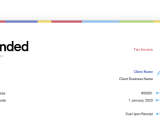
5 business tips to start 2021 off on the right foot
With 2020 squarely in the rearview mirror, it’s time to start planning for a new year with new opportunities. If you’re hoping to make the most of 2021 for your business, try out some of these tips to get off on the right foot.
Article contents
− +
Now that we have a new year stretched out in front of us, it’s a good time to take stock of the year gone by and make plans for a successful 2021. In this article, we’ve put together six actionable tips for freelancers and sole traders who want to start out the new year with a strategy for success.
5 business tips for starting 2021 off on the right foot
Tip 1: Take stock of 2020 with these questions
You may be eager to forget 2020 ever happened, but it’s important to reflect for a moment on the last 12 months, so you can incorporate your wins and losses into your plan for 2021.
Open a fresh document and pull up any records you have of what you did for your business over the last year (You can use email threads, your accounting software, daily to-do lists, etc.).
As you review these notes, write down the answers to these questions:
What was the best moment for my business this year?
What made this such a success?
What was the worst moment for my business this year?
How did I deal with this challenge?
How much did I make in income over 2020?
How close did I get to my financial goal?
What were my biggest expenses this year?
Was I prepared for these expenses?
Were these expenses worth it?
What strategies did I use to find clients this year?
Which were the most successful?
How much time did I dedicate to finding new clients?
What are the biggest changes to happen to my business over last year?
Were these positive or negative changes?
Did I predict these changes?
What new connections did I make in 2020?
How did I find these connections?
What did these connections lead to?
What surprises did I encounter over the last year?
How did I handle these surprises?
These questions are only meant to guide you—write down whatever thoughts pop into your head as you reflect. Keep these notes nearby, because you’ll need them for the next tip.
Tip 2: Map out your goals for 2021
Goals are a lot easier to achieve if you have them in writing. Now that you’ve reflected on the past year, it’s time to plan for the next 12 months.
You don’t need to write down every single thing you want to achieve this year. Your goals will likely shift as time goes on, so for this step, think big. Envision the year ahead and come up with four or five things you want to achieve for your business in 2021. These can be things like:
I want to publish a blog once a month
I want to start marketing on Instagram
I want to build an online course
I want to find 3 new retainer new clients
I want to break $100,000 in income
Once you have four or five goals that you think you can realistically achieve before the year’s end, start breaking each one into more manageable goals for each quarter. For example, if one of your goal is to bring in three new leads via your website, you might break up your goals like this:
Q1: Take a course on website conversion methods
Q2: Review my website and optimise for conversion
Q3: Identify new strategies to increase traffic to my site
Q4: Review my efforts and realign my strategy
After this, you’ll have the framework for what you want to achieve for each goal. Then you can begin breaking the first-quarter goals into even smaller monthly or weekly steps, and you’ll be well on your way to a successful 2021.
Tip 3: Be prepared to track your finances
Managing finances can be one of the most intimidating parts of being a sole trader, especially if you’re new to the world of freelancing. In 2021, you can reduce this stress by getting all of your ducks in a row early o
Freelancers can save time by using software to manage invoices, track their time, monitor their income and expenses, and prepare for tax season. The sooner you get on top of these tasks, the sooner you can begin automating some of that tough money stuff and focus on other things.
In addition to tracking your own finances, it’s a good idea to consult a tax accountant or financial advisor in your corner at the start of the year. They can look over the plan you’ve made for your business and help you fine-tune it so that you make the most of your finances from January forward.
Tip 4: Use the first half of the year to focus on your digital presence
Based on what we know about the Coronavirus vaccine, it’s likely we’ll regain some of the freedoms we sacrificed while fighting the pandemic. The latter half of the year may bring the return of in-person meetings, international travel, and live events.
But for the next few months at least, we’re in for more social distancing and working from home. This means now’s the time to work hard on your digital presence—because no matter what happens this year, online marketing will help you grow your business.
If these are indeed our last few months being stuck at home, take the time to build a website, start marketing yourself on Instagram or LinkedIn, test out Facebook advertising, or sign up for that digital course you’ve been eyeing. Chances are, once we’re given the all-clear to start socialising like we used to, you’ll be happy you took care of all that work that has to be done at your desk.
Tip 5: Make plans for your personal life and future
One of the top reasons people desire the freelance lifestyle is because it offers a better work-life balance. But in reality, it’s quite easy to lose sight of your personal life when you’re focused on running your own business.
To make sure you treat your own health and wellness with the same care you give to your business, give your personal goals the same treatment we recommended in our first tip.
Get out a sheet of paper and write down four or five things you really want to achieve this year—that have nothing to do with work. This can be anything from travelling later in the year to buying a new laptop to joining a social club.
Once you have these goals in mind, write them down and outline the things you need to achieve them. Perhaps you need some additional time off to spend with family, or you require a certain amount of money to pay off an old credit card bill.
Now, go into planning mode. What steps will you take to line up your needs with your desires? Do any of your business goals conflict with your personal goals? If so, how can you reframe them to make it work?
Hopefully, some of these tips helped you get in the right frame of mind for a fantastic 2021. From everyone at Rounded, we wish you all the best in the year to come.
Join newsletter
ABOUT ROUNDED
Invoicing and accounting software for sole traders. Get paid faster and relax at tax time.


























